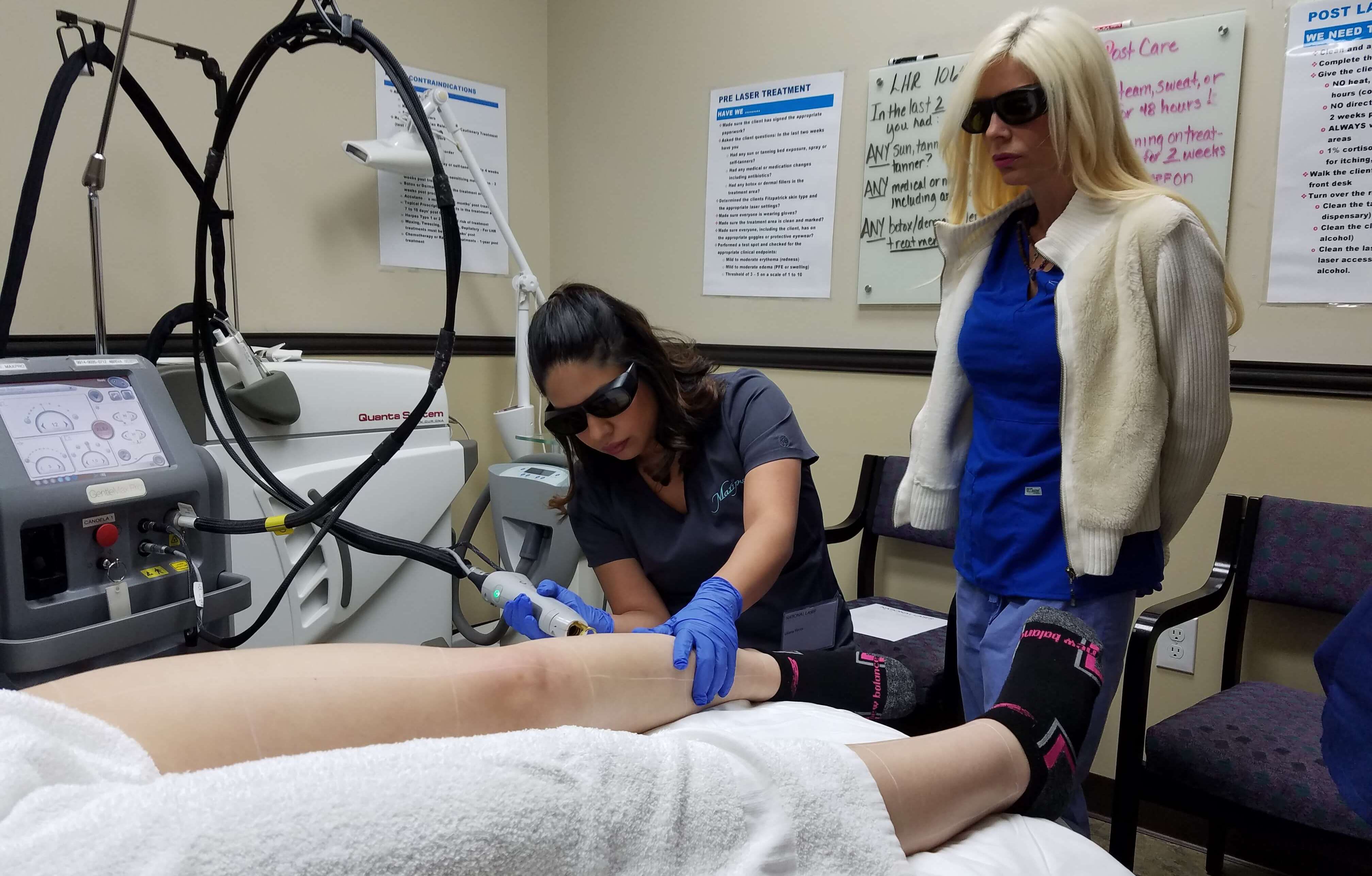

FAQs
At What Age Can You Get Laser Hair Removal
Modified: August 5, 2023
Discover the perfect age to start laser hair removal. Get answers to your general questions about laser hair removal and find out when it's best to begin this popular treatment.
(Many of the links in this article redirect to a specific reviewed product. Your purchase of these products through affiliate links helps to generate commission for Under-tec.com, at no extra cost. Learn more)
Table of Contents
Introduction
Laser hair removal has become an increasingly popular choice for individuals looking to achieve long-term hair reduction. It offers a convenient and effective solution to the hassle of frequent shaving, waxing, or plucking. However, many people wonder at what age they can start considering laser hair removal as an option.
In this article, we will explore the factors to consider when deciding on laser hair removal, and address any age limitations that may exist for this procedure. We will also discuss the importance of a consultation with a qualified professional to assess suitability and determine the best approach for achieving desired results.
Laser hair removal works by targeting and damaging the hair follicles using concentrated light beams. This process inhibits future hair growth, providing long-lasting results. It can be performed on various areas of the body, including the face, legs, underarms, bikini line, and back.
Before considering laser hair removal, it is essential to understand the factors that may affect the outcome and suitability of the procedure. Skin tone, hair color, and hair thickness are crucial considerations. Laser hair removal is most effective on individuals with fair skin and dark, coarse hair, as the laser can easily target the pigment in the hair follicle.
Ideal candidates for laser hair removal should also have a realistic expectation of the results. While the procedure can significantly reduce hair growth, it does not guarantee permanent hair removal. Some individuals may require periodic maintenance sessions to maintain the desired results.
When it comes to age limitations for laser hair removal, there is no definitive answer. The suitability of the procedure depends on individual factors, including physical development and hormonal changes. Therefore, it is crucial to consult with a trained professional who can evaluate these aspects and provide personalized recommendations.
During a consultation, the practitioner will assess the individual’s skin type, hair color, and hair thickness to determine the most appropriate laser technology and treatment plan. They will also consider any underlying medical conditions or medications that may affect the outcome of the procedure.
Understanding Laser Hair Removal
Laser hair removal is a cosmetic procedure that uses light-based technology to target and remove unwanted hair. It offers a more long-lasting solution compared to traditional hair removal methods such as shaving, waxing, or plucking. Understanding how laser hair removal works can help individuals make an informed decision about whether this treatment is right for them.
The process of laser hair removal involves emitting pulses of laser light directly to the hair follicles. The pigment in the hair follicles absorbs the light, which converts into heat and damages the follicle, inhibiting future hair growth. The surrounding skin remains unharmed as the laser is designed to target the hair follicles specifically.
It’s important to note that laser hair removal is not a one-time treatment, as hair grows in cycles. The procedure is performed over multiple sessions to target hair in various stages of growth. Typically, it takes about 6 to 8 sessions for optimal results, spaced several weeks apart.
The effectiveness of laser hair removal depends on several factors, including the individual’s skin tone and hair color. The laser primarily targets the pigment in the hair follicles, so people with light skin and dark, coarse hair tend to have the best results. However, advancements in laser technology have made it possible for individuals with darker skin tones and lighter hair colors to also benefit from laser hair removal.
While laser hair removal offers significant hair reduction, it’s important to understand that it may not result in permanent hair removal. Most individuals experience a significant reduction in hair growth, but some hair regrowth may occur over time. Maintenance sessions may be required to sustain the desired outcome.
When considering laser hair removal, it’s crucial to choose a reputable clinic or facility with trained and certified professionals. The practitioner should assess the individual’s skin type, hair color, and hair thickness to determine the most suitable laser technology and treatment plan.
During the procedure, individuals may experience some discomfort, often described as a stinging or snapping sensation. However, many clinics offer various methods to minimize discomfort, such as applying a cooling gel before the treatment or using a device that blows cold air during the procedure.
Understanding the ins and outs of laser hair removal can help individuals make an informed decision about whether it’s the right choice for them. By consulting with a qualified professional and discussing individual needs and expectations, individuals can determine if laser hair removal is the most suitable option to achieve their desired results.
Factors to Consider
Before undergoing laser hair removal, there are several factors that individuals should take into consideration to ensure the best possible outcome. These factors can contribute to the effectiveness of the treatment and play a role in determining if laser hair removal is the right option for a particular individual.
Skin Tone: Laser hair removal works best on individuals with fair to medium skin tones. This is because the laser targets the pigment in the hair follicles, and a significant contrast between the skin and hair color allows for more effective treatment. Individuals with darker skin tones may still be eligible for laser hair removal, but it is crucial to consult with a qualified professional who has experience working with diverse skin types.
Hair Color and Thickness: The ideal candidates for laser hair removal have dark, coarse hair. This is because the laser seeks out the pigment in the hair follicle and effectively damages it. Individuals with lighter hair colors, such as blonde or gray, may not achieve the same results as those with darker hair. Laser hair removal can still be performed on individuals with lighter hair, but it may require more sessions to achieve the desired outcome.
Medical History: When considering laser hair removal, it is important to disclose any relevant medical history to the practitioner. Certain medical conditions, such as polycystic ovary syndrome (PCOS) or hormonal imbalances, can affect hair growth and may require a different approach to treatment. Additionally, certain medications or treatments, such as antibiotics or chemotherapy, can make the skin more sensitive and may impact the timing of laser hair removal sessions.
Expectations and Patience: Laser hair removal is not a quick fix, and it requires patience and commitment. It typically takes multiple sessions to see optimal results, and individuals should be prepared for this ongoing process. It is also important to have realistic expectations regarding hair reduction rather than complete hair removal. While significant hair reduction can be achieved, some hair regrowth may occur over time and may require maintenance sessions to maintain the desired results.
Budget: Laser hair removal is an investment, and individuals should consider their budget when deciding on this treatment. The cost of laser hair removal can vary depending on various factors, including the treatment area and the number of sessions required. It is advisable to consult with different clinics and compare prices while keeping in mind that the quality of the facility and the experience of the practitioner are crucial factors to consider.
By taking these factors into account, individuals can make a more informed decision about whether laser hair removal is the right choice for them. Consulting with a qualified professional who can assess individual needs and provide personalized recommendations is essential to achieving the best possible results.
Ideal Candidates for Laser Hair Removal
Laser hair removal is a versatile and effective procedure, but not everyone is an ideal candidate for this treatment. Understanding who is most likely to benefit from laser hair removal can help individuals make an informed decision about whether this method is suitable for them.
Individuals with fair to medium skin tones and dark, coarse hair tend to have the best results with laser hair removal. This is because the laser targets the pigment in the hair follicles, and a clear contrast between the skin and hair color allows for more effective treatment. However, advancements in laser technology have made it possible for individuals with darker skin tones or lighter hair colors to also achieve positive outcomes.
One of the primary reasons people opt for laser hair removal is to reduce or eliminate unwanted hair growth. The procedure can be performed on various areas of the body, including the face, legs, underarms, bikini line, back, and more. Ideal candidates for laser hair removal are those who are looking for a long-term solution and are willing to commit to multiple sessions to achieve the desired results.
Good candidates for laser hair removal should have realistic expectations about the outcome. While laser hair removal can significantly reduce hair growth, it is important to understand that it may not result in complete hair removal. Some hair regrowth may occur over time, and periodic maintenance sessions may be necessary to maintain the desired level of hair reduction.
It is important for individuals interested in laser hair removal to be in overall good health. Any underlying medical conditions or medications that may affect the outcome of the procedure should be disclosed to the practitioner during the consultation. Additionally, individuals who are pregnant or breastfeeding may be advised to postpone laser hair removal until a later time.
Individuals with a history of keloid scarring or skin sensitivities may need to exercise caution when considering laser hair removal. The practitioner will assess the individual’s skin type and medical history to determine the most appropriate laser technology and treatment plan.
Age is not necessarily a limiting factor for laser hair removal, as it can be performed on individuals of various ages. However, it is important to ensure that the individual has reached a suitable stage of physical development and hormonal stability before proceeding with the treatment. Consulting with a trained professional can help determine if laser hair removal is the right choice for individuals of different age groups.
In summary, ideal candidates for laser hair removal are those with fair to medium skin tones, dark, coarse hair, and realistic expectations regarding hair reduction. They should be in good overall health and have reached a suitable stage of physical development. Consulting with a qualified professional is essential to assess individual suitability and ensure the best possible outcome.
Age Limitations for Laser Hair Removal
When it comes to laser hair removal, age is not necessarily a limiting factor. The suitability of the procedure depends more on an individual’s stage of physical development and hormonal changes rather than their age. Laser hair removal can be performed on individuals of various ages, as long as they meet the necessary criteria.
It is important to note that laser hair removal is not recommended for children or prepubescent individuals. This is because their hormones and physical development are still changing, and it may be difficult to predict the long-term effects of the treatment. It is generally advised to wait until the individual reaches a suitable stage of physical development and hormonal stability before considering laser hair removal.
Teenagers who have reached puberty and have started developing body hair may be considered for laser hair removal. However, it is vital to consult with a qualified professional who can assess their physical development and discuss the potential benefits and risks of the procedure.
For adults, there are no strict age limitations for laser hair removal. As long as an individual is in good overall health and has realistic expectations about the outcome, they can undergo the treatment. The practitioner will evaluate their skin type, hair color, and hair thickness to determine the most suitable laser technology and treatment plan.
Older individuals can also benefit from laser hair removal. As we age, unwanted hair growth can become more noticeable or bothersome. Laser hair removal offers a convenient and effective solution to address this issue. However, it is important to consider any underlying medical conditions or medications that may impact the procedure, as well as ensure that the individual’s skin is suitable for laser treatment.
It is worth mentioning that the effectiveness of laser hair removal may vary from person to person, regardless of age. Factors such as skin tone, hair color, and hair thickness can all impact the outcome. Additionally, multiple sessions may be required to achieve the desired level of hair reduction, regardless of age.
Consulting with a qualified professional is crucial, regardless of age, to determine if laser hair removal is appropriate and to ensure the best possible results. The practitioner will conduct a thorough assessment, taking into account individual factors, to provide personalized recommendations and guide the individual through the treatment process.
In summary, laser hair removal is not limited by age, but it is essential to consider an individual’s stage of physical development and hormonal changes. The procedure can be performed on teenagers and adults, as long as they meet the necessary criteria for suitability. Consultation with a qualified professional is key to determining if laser hair removal is the right choice for individuals of different age groups.
Consultation Process
Before undergoing laser hair removal, it is crucial to schedule a consultation with a qualified professional. The consultation process plays a vital role in assessing an individual’s suitability for the procedure and designing a personalized treatment plan to achieve the best possible results.
During the consultation, the practitioner will evaluate several factors to determine if laser hair removal is appropriate for the individual. These factors typically include the individual’s skin type, hair color, hair thickness, and any relevant medical history or medications.
Assessing the individual’s skin type is essential because laser hair removal works best on individuals with fair to medium skin tones. The practitioner will determine the skin type using the Fitzpatrick scale, which classifies skin into different categories based on its response to UV radiation. This classification helps the practitioner select the appropriate laser technology for the treatment.
Next, the practitioner will assess the individual’s hair color and thickness. Laser hair removal targets the pigment in the hair follicles, so individuals with dark, coarse hair tend to have the best results. However, advancements in laser technology have made it possible for individuals with lighter hair colors to also benefit from the procedure.
The consultation is also an opportunity to discuss the individual’s expectations and desired outcome. It’s important for individuals to have realistic expectations regarding the level of hair reduction that can be achieved with laser hair removal. The practitioner will provide insight into what can be realistically expected based on the individual’s unique circumstances.
Medical history and current medications are important considerations during the consultation. Certain medical conditions or medications may affect the individual’s suitability for laser hair removal or the timing of the treatment sessions. It is crucial to provide the practitioner with a comprehensive overview of any medical conditions, prescriptions, or over-the-counter treatments being used.
Once all the necessary information has been gathered, the practitioner will develop a personalized treatment plan. This plan will outline the recommended number of treatment sessions, intervals between sessions, and any pre and post-treatment instructions to ensure optimal results and minimize any potential risks.
The consultation is also an opportunity for the individual to ask any questions or express concerns they may have. It’s important to have a clear understanding of the procedure, the expected outcomes, and the potential side effects before proceeding with laser hair removal.
By undergoing a thorough consultation, individuals can make an informed decision about whether laser hair removal is the right choice for them. The practitioner’s expertise and assessment during this process will help determine the suitability of the individual for the procedure and ensure that they are well-prepared for their treatment sessions.
Conclusion
Laser hair removal offers a convenient and effective solution for individuals looking for long-term hair reduction. While age is not necessarily a limiting factor for this procedure, it is important to consider factors such as physical development, hormonal changes, and individual suitability when deciding on laser hair removal.
Understanding how laser hair removal works and the factors to consider before undergoing the treatment is crucial. Factors such as skin tone, hair color, hair thickness, medical history, expectations, and budget all play a role in determining the effectiveness of the procedure.
Ideal candidates for laser hair removal are those with fair to medium skin tones and dark, coarse hair. However, advancements in laser technology have made it possible for individuals with different skin tones and hair colors to benefit from the treatment.
The consultation process is an essential step before undergoing laser hair removal. During this process, a qualified professional will assess an individual’s suitability for the treatment and develop a personalized treatment plan based on their unique circumstances.
It is important to have realistic expectations and understand that laser hair removal may not result in complete hair removal. Maintenance sessions may be necessary to sustain the desired level of hair reduction.
In conclusion, laser hair removal can be a highly effective and convenient solution for individuals looking to reduce unwanted hair growth. By considering the factors discussed in this article and consulting with a trained professional, individuals can make an informed decision about whether laser hair removal is the right choice for them. Taking the time to research, understand the procedure, and discuss expectations with a qualified practitioner will ensure the best possible outcome and a more confident, hair-free future.








